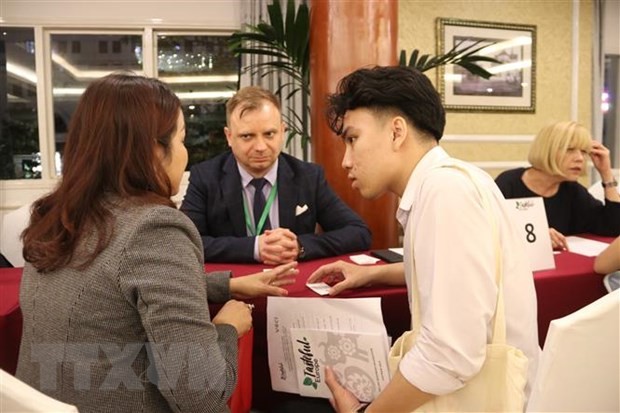
Vietnam, Poland want to step up food trade
Latest
 |
| Vietnam, Poland businesses exchange cooperation opportunities in the food trade. (Source: VNA) |
Maciej Duszynski, Chargé d'Affaires a.i of the Polish Embassy, highlighted the growing trade and investment cooperation between the EU and Vietnam, saying the EU has remained Vietnam’s second largest importer and Vietnam is now the EU’s major trade partner.
Thanks to that, the long-standing Vietnam-Poland relations have grown constantly in all areas, including the trade of agricultural products and food, he said, taking note of discussions on this issue held by leaders of ministries and agencies from the two sides.
The Government of Poland is paying great attention to expanding export portfolios to Vietnam, with final steps being undertaken for the shipment of beef products and blueberries to the Southeast Asian country.
Piotr Harasimowicz, Chief Representative Officer of the Polish Investment and Trade Agency in Ho Chi Minh City, said Vietnam has a favourable location in an Asian vibrant market region, and developed infrastructure for trade expansion.
Vietnam is also an important buyer of Poland’s agricultural products and food, he said, citing the fact that last year, Poland exported more than 143 million EUR worth of the products to Vietnam. Poland’s commodity shipments to Vietnam surged 21.5% while Vietnam’s imports from Poland rose by 26% year-on-year in the period from August 2020 to May 2021.
He affirmed that his agency will actively support Polish exporters to connect with Vietnamese enterprises and provide foreign investors with information on conditions and rules for doing business in Poland.
Nguyen Huu Nam, Deputy Director of the VCCI in HCM City, said though both countries have advantages in agricultural production, their products are not competitive but complementary to each other. Poland is currently in high demand for rice, basa fish, shrimp, mango, pineapple, passion fruit, coffee and cashew nut from Vietnam; and capable of supplying Vietnam with various EU-standardised fresh and processed food and fruits, beef, lamb, pork and others, he added.
Vietnam can learn from Poland’s experience in developing hi-tech agriculture, he continued. Vietnam also wants to receive Poland’s support in pushing for the EU’s early ratification of the EU-Vietnam Investment Protection Agreement (EVIPA) and removal of the EC's “yellow card” warning against Vietnamese seafood.
These will have positive impacts, lifting the Vietnam-Poland trade and investment relations to a new height, he emphasised.





















